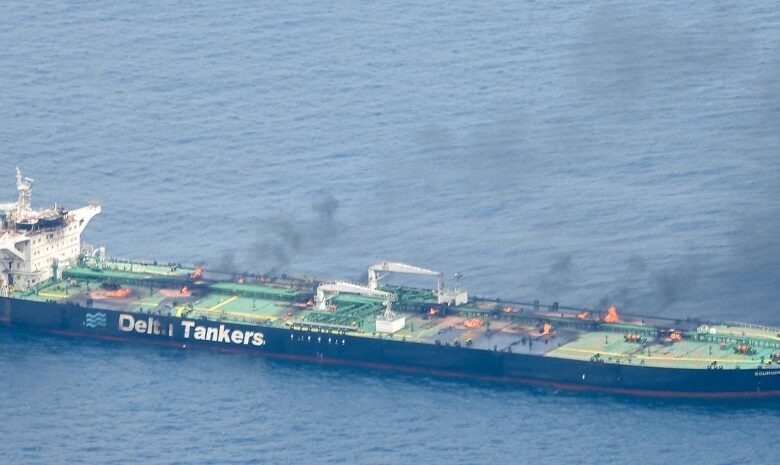Saudi Arabia and Greece Coordinate to Avert ‘Sounion ’ Disaster in the Red Sea

Yemen Monitor/Newsroom
A report by Bloomberg revealed that Saudi Arabia and Greece are “coordinating to avert a disaster” caused by the oil tanker Sounion in the Red Sea, which was attacked by the Iranian-backed Houthi rebels in Yemen last week.
According to informed sources, “Greece is leading efforts to offload the oil tanker,” which was carrying 150,000 tons of Iraqi crude oil when it was attacked by Houthi groups in Yemen.
While the ship’s crew was successfully rescued, parts of it caught fire, and it is unclear if there is currently an oil spill.
Sources told Bloomberg that “under the planned rescue plan for the ship, the oil on board will be transferred to another ship, which will be towed to a safe port, possibly in Djibouti.”
The sources added that ships from Greece, France, and Italy, belonging to the European Union’s naval mission in the Red Sea, “ASPIDES,” will accompany the Sounion during the rescue operation, and Saudi Arabia is likely to oversee the oil transfer process.
The sources also explained that the plan came “as a result of close coordination between Greece, European partners, and regional actors, including Saudi Arabia, in addition to Athens utilizing communication channels with Iran, the main supporter of the Houthis.”
The Iranian mission to the United Nations confirmed on Wednesday that the Houthis in Yemen had agreed to a temporary truce to allow tugboats and salvage vessels to reach the damaged oil tanker Sounion in the Red Sea, which flies the Greek flag, while the group itself denied this.
The EUNAVFOR MED Operation ASPIDES ” stated on Thursday that no oil spill has been detected from the damaged Greek-flagged tanker, while salvage operations have begun despite ongoing fires on the vessel following Houthi attacks.
The Houthis carried out multiple attacks, including planting bombs on the already disabled Sounion , which is 274.2 meters long and carries about one million barrels of oil, according to Reuters.
The Houthis announced on Wednesday that they would allow rescue teams to tow the burning vessel, which has been on fire since August 23, before storming the ship on Thursday and broadcasting footage of them planting bombs and detonating the deck.
The EUNAVFOR MED Operation ASPIDES pledged to “facilitate any operations” in coordination with European authorities and neighboring countries to avoid a catastrophic environmental crisis and salvage the vessel Sounion .
Pentagon press secretary Sabrina Singh said on Thursday that the crude oil barrels on the Sounion were “intact” and that some oil had leaked from the ship itself from the part that was targeted. She added that several fires were still burning.
The EUNAVFOR MED Operation ASPIDES said in a post on X on Monday that fires have been burning on the Greek-flagged Sounion since August 23 after an attack by the Yemeni Houthi group.
The Houthis’ decision to allow rescue teams to reach the tanker came after several countries expressed humanitarian and environmental concerns.
This step could help avoid what experts have warned of, which is a spill of about 150,000 tons of crude oil into the Red Sea, which would have catastrophic consequences, according to Reuters.
An oil spill of this magnitude would be more than half the size of the largest recorded spill from a ship, which occurred in 1979 after 287,000 tons of oil leaked from the ship Atlantic Empress, according to the International Tanker Owners Pollution Federation.
The Houthis have sunk two ships and killed at least three sailors during their 10-month campaign, which has disrupted international maritime shipping, forcing shipping companies to avoid passing through the Suez Canal.
The Houthis say they are targeting Israeli or Israeli-bound ships as part of their support for Gaza against the Israeli aggression.
It is worth noting that the Sounion is the third ship operated by Delta Tankers, based in Athens, to be attacked in the Red Sea this month.




